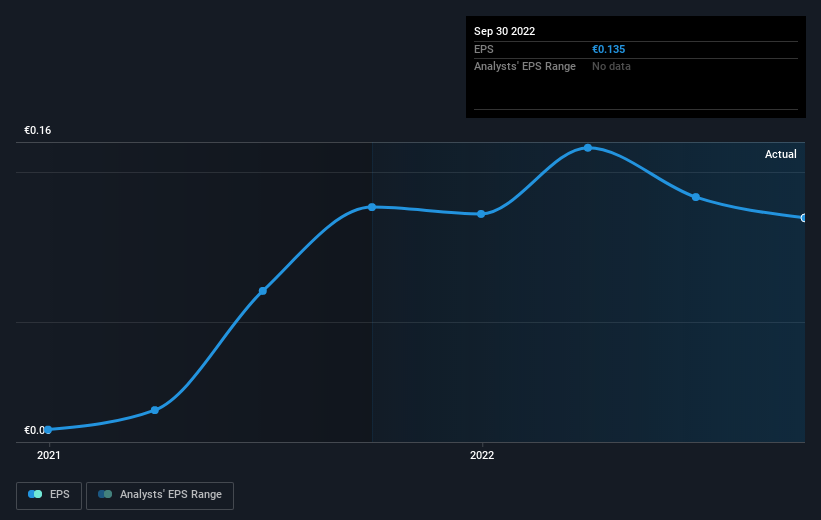Stock Analysis
- Greece
- /
- Capital Markets
- /
- ATSE:EXAE
Hellenic Exchanges - Athens Stock Exchange (ATH:EXAE) stock performs better than its underlying earnings growth over last three years

By buying an index fund, investors can approximate the average market return. But if you pick the right individual stocks, you could make more than that. For example, the Hellenic Exchanges - Athens Stock Exchange S.A. (ATH:EXAE) share price is up 37% in the last three years, clearly besting the market return of around 18% (not including dividends).
Since it's been a strong week for Hellenic Exchanges - Athens Stock Exchange shareholders, let's have a look at trend of the longer term fundamentals.
Check out our latest analysis for Hellenic Exchanges - Athens Stock Exchange
While the efficient markets hypothesis continues to be taught by some, it has been proven that markets are over-reactive dynamic systems, and investors are not always rational. One way to examine how market sentiment has changed over time is to look at the interaction between a company's share price and its earnings per share (EPS).
Hellenic Exchanges - Athens Stock Exchange was able to grow its EPS at 8.1% per year over three years, sending the share price higher. This EPS growth is lower than the 11% average annual increase in the share price. So it's fair to assume the market has a higher opinion of the business than it did three years ago. That's not necessarily surprising considering the three-year track record of earnings growth.
The graphic below depicts how EPS has changed over time (unveil the exact values by clicking on the image).

It might be well worthwhile taking a look at our free report on Hellenic Exchanges - Athens Stock Exchange's earnings, revenue and cash flow.
What About Dividends?
When looking at investment returns, it is important to consider the difference between total shareholder return (TSR) and share price return. Whereas the share price return only reflects the change in the share price, the TSR includes the value of dividends (assuming they were reinvested) and the benefit of any discounted capital raising or spin-off. Arguably, the TSR gives a more comprehensive picture of the return generated by a stock. We note that for Hellenic Exchanges - Athens Stock Exchange the TSR over the last 3 years was 55%, which is better than the share price return mentioned above. The dividends paid by the company have thusly boosted the total shareholder return.
A Different Perspective
Hellenic Exchanges - Athens Stock Exchange's TSR for the year was broadly in line with the market average, at 36%. That gain looks pretty satisfying, and it is even better than the five-year TSR of 5% per year. It is possible that management foresight will bring growth well into the future, even if the share price slows down. I find it very interesting to look at share price over the long term as a proxy for business performance. But to truly gain insight, we need to consider other information, too. Take risks, for example - Hellenic Exchanges - Athens Stock Exchange has 2 warning signs (and 1 which is a bit concerning) we think you should know about.
But note: Hellenic Exchanges - Athens Stock Exchange may not be the best stock to buy. So take a peek at this free list of interesting companies with past earnings growth (and further growth forecast).
Please note, the market returns quoted in this article reflect the market weighted average returns of stocks that currently trade on Greek exchanges.
Valuation is complex, but we're helping make it simple.
Find out whether Hellenic Exchanges - Athens Stock Exchange is potentially over or undervalued by checking out our comprehensive analysis, which includes fair value estimates, risks and warnings, dividends, insider transactions and financial health.
View the Free AnalysisHave feedback on this article? Concerned about the content? Get in touch with us directly. Alternatively, email editorial-team (at) simplywallst.com.
This article by Simply Wall St is general in nature. We provide commentary based on historical data and analyst forecasts only using an unbiased methodology and our articles are not intended to be financial advice. It does not constitute a recommendation to buy or sell any stock, and does not take account of your objectives, or your financial situation. We aim to bring you long-term focused analysis driven by fundamental data. Note that our analysis may not factor in the latest price-sensitive company announcements or qualitative material. Simply Wall St has no position in any stocks mentioned.
About ATSE:EXAE
Hellenic Exchanges - Athens Stock Exchange
Hellenic Exchanges - Athens Stock Exchange S.A.
Flawless balance sheet with solid track record.

